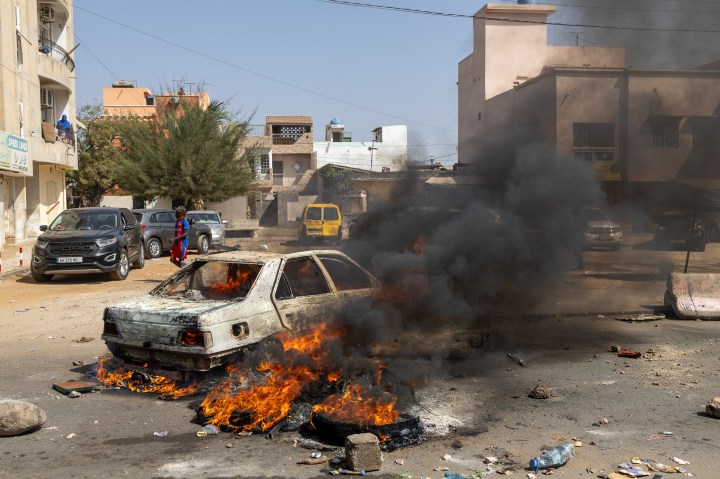ISS TODAY OP-ED
Breaking of Senegal election deadlock a critical move in preventing further unrest and bloodshed

The Constitutional Council’s decision to overturn the postponement of presidential polls could provide a way out of the crisis.
Opposition members from the Yewwi Askanwi parliamentary group in Senegal have successfully challenged President Macky Sall’s attempt to delay the country’s elections. Several political prisoners were also released yesterday in response to domestic and international pressure.
Sall’s decision on 3 February to postpone the polls scheduled for 25 February had been backed by legislation passed two days later. That legislation declared 15 December as the new election date — effectively extending Sall’s presidency by nearly a year.
Opposition parliamentarians appealed to the Constitutional Council on 8 February to have the legislation annulled, and yesterday the council ruled that the law was unconstitutional. The council also cancelled a decree announced by Sall that started the process of postponing elections.
Read more in Daily Maverick: Senegal constitutional council finds election delay was unlawful
Some of Senegal’s opposition have welcomed the council’s decision, but the electoral process and calendar remain unclear, with only nine days left before the original date of 25 February. In its decision yesterday, the council said holding the elections in a little over a week would be impossible, but voting should happen ‘as soon as possible’. The council has asked the president to set a reasonable date.
The 5 February law that granted the postponement was voted in by the ruling Benno Bokk Yakaar (BBY) coalition and the Senegalese Democratic Party (PDS), whose alliance in the National Assembly gave them the 60% threshold needed to pass the law. But the process was chaotic, with opposition deputies forcibly removed from the chamber by security forces, and no debate occurred.
The crisis deepened concerns among Senegalese citizens and regional and international stakeholders about an apparent democratic backsliding, and raised alarm about Senegal’s political stability in a region embroiled in insecurity.
Sall justified the postponement by citing PDS allegations of corruption levelled against two magistrates of the Constitutional Council and Prime Minister Amadou Ba. PDS Members of Parliament (MPs) had called for a parliamentary inquiry into the council’s decision to disqualify their presidential candidate Karim Wade.
Although not yet proven, the PDS’ allegations have undermined the council’s credibility, which the opposition had previously criticised. Even so, the council’s decisions, including yesterday’s ruling, are critical to Senegal’s short- to medium-term stability.
Strategic decision
Despite Sall’s stated reasons for attempting to postpone the election, many Senegalese suspect he acted out of fear of an impending defeat of his BBY coalition candidate.
For the PDS, delaying the election could have paved the way for Wade, who is now exclusively of Senegalese nationality, to get back on the ballot. It would also allow the ruling BBY to resolve internal disagreements over Ba’s candidacy, which have threatened the coalition’s electoral prospects.
The PDS and BBY coalition issues make opposition candidate Bassirou Diomaye Faye, who it is believed is still in prison, a significant challenger to the ruling party candidate. Faye has been endorsed by prominent jailed opposition leader Ousmane Sonko, whose Patriotes Africains du Sénégal pour le Travail, l’Ethique et la Fraternité (Pastef) party was dissolved in July 2023.
Sonko’s endorsement is in addition to support for Faye by several opposition parties and civil society movements that advocate for a change in government. Faye thus stands as the primary obstacle to the ruling coalition’s victory.
The opposition parties’ petition to the Constitutional Council was based on Article 103 of the constitution, which states that “the republican form of the State, the method of election, and the duration and number of consecutive terms of office of the President of the Republic cannot be revised”. It is also based on the council’s ruling of 12 February 2016, which prevented the president from reducing his term of office.
The council’s decision yesterday to invalidate the law postponing the election could ease tensions in Senegal. It aligns with the positions of political players, civil society organisations and trade unions, as well as regional, continental and international stakeholders.
Had the council not annulled the legislation, the legitimacy of the president after 2 April (when his term should end) would probably have been challenged by the opposition and civil society, potentially leading to more protests. Already, public demonstrations have resulted in at least three deaths.
Deep divisions among Senegal’s political actors mean that the support of national mediators and the Economic Community of West African States (Ecowas) will be essential in resolving the crisis. Now that the council has invalidated the postponement law, both should immediately call for the ruling to be respected. They should also help national stakeholders organise a peaceful and credible election once there is clarity on a new timeline.
Consideration should now be given to finding a political compromise while choosing a new date for the polls. Both processes will need to consider the president’s status when his term expires. This will allow the administration to focus on preparations for voting and the electoral campaign. DM
Paulin Maurice Toupane, Senior Researcher and Seydou Daffe, Junior Fellow, Institute for Security Studies (ISS), Regional Office for West Africa, the Sahel and the Lake Chad Basin.
First published by ISS Today.




















 Become an Insider
Become an Insider
Comments - Please login in order to comment.